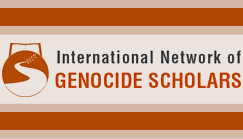
Panel 6 - Collective Reburial in Post-Genocide and Mass-Violence Contexts: Collectively Reshaping Mass Death and Its Aftermath
Start Date
26-9-2020 2:00 PM
End Date
26-9-2020 3:30 PM
Loading...
Submission Type
Panel
Abstract
This panel is organized in the frame of a research program (Transfunerary https://funeraire.hypotheses.org/) focusing on a comparative analysis of collective reburial and funerary practices currently occurring in post-mass violence contexts, in Europe and Latin America. In contemporary post-genocide or mass crime situations, exhumation is indeed used as an essential tool in transitional justice processes. In several countries concerned in the long run with mass exhumations (such as for example Bosnia, Spain, Cyprus, Argentina, Peru or Guatemala), the return of human remains en masse has led to numerous collective reburials that have so far received little attention as such. This program aims at enlightening the funerary rituals transformation or adaptation to large scale performance, but also the religious and political arrangements that lie beneath, and enable societies to deal with difficult issues such as fragmented or absent bodies. Beside an interrogation upon funeral grammar and glossaries adaptability as well as upon forensics expertise impact, the program aims at questioning the reshaping of the relationships to the dead in post-mass violence contexts.
Presentations
Elisabeth Anstett: Collective anonymous reburials of great terror victims in Russia: about mass death and identity erasure
Clara Duterme: Sense of belonging and Ixil post-genocide identities in Guatemalan collective reburials
Laura Panizo: The "care" in the restitution of bodies of detainees-disappeared from the Pinochet dictatorship
Galia Valtchinova: Counting, Disinterment, Reburial: dealing with the victims of communism in Bulgaria
Panel 6 - Collective Reburial in Post-Genocide and Mass-Violence Contexts: Collectively Reshaping Mass Death and Its Aftermath
This panel is organized in the frame of a research program (Transfunerary https://funeraire.hypotheses.org/) focusing on a comparative analysis of collective reburial and funerary practices currently occurring in post-mass violence contexts, in Europe and Latin America. In contemporary post-genocide or mass crime situations, exhumation is indeed used as an essential tool in transitional justice processes. In several countries concerned in the long run with mass exhumations (such as for example Bosnia, Spain, Cyprus, Argentina, Peru or Guatemala), the return of human remains en masse has led to numerous collective reburials that have so far received little attention as such. This program aims at enlightening the funerary rituals transformation or adaptation to large scale performance, but also the religious and political arrangements that lie beneath, and enable societies to deal with difficult issues such as fragmented or absent bodies. Beside an interrogation upon funeral grammar and glossaries adaptability as well as upon forensics expertise impact, the program aims at questioning the reshaping of the relationships to the dead in post-mass violence contexts.



